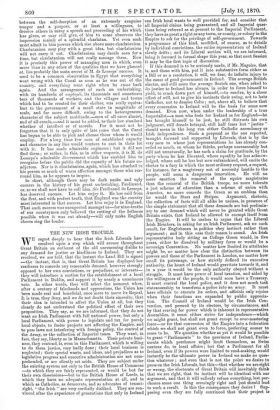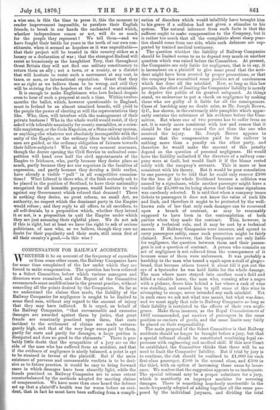THE NEW IRISH TROUBLE.
WE regret deeply to hear that the Irish Liberals have resolved upon a step which will arouse throughout Great Britain an outburst of the old unreasoning dislike to any demand for justice or kindliness to Ireland. They are resolved, we are told, that the instant the Land Bill is signed —the instant, that is, that Great Britain has displayed her readiness to concede any reasonable demand, however strongly opposed to her own convictions, or prejudices, or interests— they will introduce a motion for the establishment of a local Parliament in Dublin, and support it by nearly a unanimous vote. In other words, they will select the moment when, after a century of falsehoods and oppressions, the Union has been made real and beneficial, once more to move its Repeal. It is true, they deny, and we do not doubt their sincerity, that their idea is intended to affect the Union at all, but they clearly do not understand the political effect of their own proposition. They say, as we are informed, that they do not want an Irish Parliament with full national power, but only a local Parliament, with power to legislate and tax for purely local objects, to foster projects not affecting the Empire, and to pass laws not interfering with foreign policy, the control of the Army, or the collection of Imperial taxes. They want, in fact, they say, liberty as in Massachusetts. Their private busi- ness, they contend, is, even in this Parliament, which is willing to do them justice, very badly done ; their local business is neglected ; their special wants, and ideas, and prejudices as to legislative progress and executive administration are not com- prehended, or are silently set aside. They are subject under the existing system not only to the British House of Commons in which they are fairly represented, or would be but for their own dissensions—but to the British House of Lords, in which they have no adequate representation at all, and in which as Catholics, as democrats, and as advocates of tenant- right, " the Irish " are very cordially disliked. They are con- vinced after the experience of generations that only in Ireland can Irish local wants be well provided for, and consider that all Imperial claims being guaranteed, and all Imperial ques- tions being referred as at present to the Imperial Parliament, they have as great a right as any town, or county, or colony in the Empire to ask for the privilege of self-government. Towards a programme of this kind, modified, of course, as to details by individual convictions, the entire representation of Ireland slowly drifts ; and its Liberal section will, we are informed, bring it forward in formal shape this year, so that next Session it may be the first topic of discussion.
If this demand is to be seriously made, if Mr. Maguire, that is, and those with him, put it into substantive form either as a Bill or as a resolution, it will, we fear, do infinite injury to the cause of good government in Ireland. The average British elector, and still more the average Scotch one, when asked to do justice to Ireland has always, in order to force himself to yield, to crush down part of himself,—to resolve, by a sheer effort of will, not to give his instincts their swing, not to hate Catholics, not to despise Celts ; not, above all, to believe that every concession to Ireland will be the basis for some new demand. Even now, when under the leadership of a true Imperialist—a man who feels for Ireland as for England—he has brought himself to be just, he still distrusts his own judgment, still dreads betrayal, still half fears lest "justice " should mean in the long run either Catholic ascendancy or Irish independence. Such a proposal as the one reported, brought forward and supported by Liberals, that is by the very men to whose just representations he has already con- ceded so much, on whom he thinks, perhaps unreasonably but still not unnaturally, he has such a claim for gratitude, by the party whom he has liberated, whose equality he has acknow- ledged, whose soil he has but now enfranchised, will excite the elector to a fury in which the most ordinary request, a request, for instance, for a magistracy not of necessity hostile to the people, will seem a dangerous innovation. He will no more sanction the removal of the squire magistrates than the removal of the British troops, no more tolerate a just scheme of education than a scheme of union with America, no more concede the Green as an emblem than he would the Stars and Stripes. Argument, rhetoric, the collection of facts will all alike be useless, in presence of the simple statement that all these demands are but prelimin- ary to one demand which will never be granted while Great Britain exists, that Ireland be allowed to exempt itself from the Empire. It will be useless to argue that the Liberal Irish Members, in asking for an Irish Parliament, ask no such result, for Englishmen in politics obey instinct rather than argument ; and in this case their reason is sound. An Irish representative body sitting on College Green would, in five years, either be dissolved by military force or would be a sovereign Convention. No matter how limited its attributes might be, no matter how clear the distinction between its powers and those of the Parliament in London, no matter how small its patronage, or how strictly defined its executive authority, the heart of Ireland would gravitate towards it, and in a year it would be the only authority obeyed without a struggle. It must have power of local taxation, and aided by the willingness of the people, it would soon have a Treasury. It must control the local police, and it does not much task statesmanship to transform a police into an army. It must have officials to execute its orders, and officials only rejoice when their functions are expanded by public apprecia- tion. The Council of Ireland would be the Irish Con- vention, and pressed by its electors, by circumstances, and by that craving for power which is inherent in representative Assemblies, it must either strive for independence—which we might grant, but shall not grant except to over-mastering force—or for that conversion of the Empire into a federation which we shall not grant even to force, preferring sooner to cease to be. We question whether as yet it would be possible to grant "Parliaments " to the provinces of Ireland, Parlia- ments which perchance might limit themselves, as Swiss cantons do, to local affairs ; but that a Parliament for all Ireland, even if its powers were limited to road-making, would instantly be the ultimate power in Ireland we make no ques- tion whatever ; and even that is not the point we desire to press on the Irish Liberals, but this—that whether we are right or wrong, the electorate of Great Britain will inevitably think that we are right, that its instinct will be identical with our argument, and that it will sullenly refuse everything, lest per- chance some one thing seemingly right and just should lead to such a result. Is this the consequence they desire ? Sup- posing even they are fully convinced that their project is
a wise one, is this the time to press it, this the moment to render improvement impossible, to paralyze their English friends, to break in our hands the enchanted wand which, whether independence comes or not, will do so much for the people they represent ? We tell them—and we have fought their battle for years in the teeth of our own con- stituents, when it seemed as hopeless as it was unprofitable— that their project will be treated in this country either as a lunacy or a declaration of war ; that the strongest Radical will resist as tenaciously as the haughtiest Tory, that throughout Great Britain they will not find one solitary constituency to return them an ally ; not a town, or a county, or a district that will hesitate to resist such a movement at any cost, in taxes, or men, or international reputation. Grant that they are as right as we believe them to be wrong, and still they will be striving for the hopeless at the cost of the attainable.
It is enough to make Englishmen who love Ireland despair even to hear of such a proposal at such a time. Within twelve- months the ballot, which, however questionable in England, must in Ireland be an almost unmixed benefit, will yield to the people the power of electing at will the representatives they like. Who, then, will interfere with the management of their private business ? Who in the whole world would resist, if they asked with tolerable unanimity for county assemblies, or a scien- tific magistracy, or the Code Napoleon, or a State railway system, or anything else whatever not absolutely incompatible with the unity of the Empire, or the ordinary ideas by which civilized men are guided, or the ordinary obligation of fairness towards their fellow-subjects ? Who at this very moment murmurs, though the decree opening the Civil Service to unlimited com- petition will hand over hall the civil appointments of the Empire to Irishmen, who, partly because they desire place so much, partly because they are our superiors in the faculties of expression, and partly because they develop a little earlier, have already a visible " pull" in all competitive examina- tions ? What Liberal is there who, if the Irish seriously ask to be placed in the position of Scotland, to have their nationality recognized for all honorific purposes, would hesitate to vote against any Government which refused that demand ? There is nothing they desire, no great reform, no small Act, no authority, no respect which the dominant party in the Empire would refuse ; and they reply to all offers, to all sacrifices, to all self-denials, by a proposition which, whether they intend it or not, is a proposition to quit the Empire under which they are just assuming their rightful place. We do not ask if this is right, but at least we have the right to ask of serious politicians, of men who, as we believe, though they care no doubt for their popularity and their seats, still mean first of all their country's good,—Is this wise ?































 Previous page
Previous page